India’s digital revolution is gathering speed, fuelled by rapid cloud adoption and a surge in online services—from e-commerce to logistics and fintech. Yet amid this data tsunami, legacy databases often struggle to deliver the performance and agility modern businesses require. Enter
The conversation also offers a sneak peek into the upcoming TiDB User Day India 2025, a forum for professionals to explore innovative solutions for modern data challenges.1. What are some of the key challenges enterprises face with traditional database management systems? And how are distributed databases like TiDB addressing these pain points?
Enterprises grapple with slow queries, database overload, massive datasets, and the constant struggle of maintaining schema consistency and operational efficiency, and traditional databases struggle to meet these demands due to scalability issues in single-machine environments, limitations in real-time processing, vulnerabilities to single-point failures, and complexity of data integration. TiDB tackles these challenges with its scalable, high-availability architecture, separating computing from storage for effortless scaling. Its HTAP capabilities enable real-time analytics without disrupting transactions, while ProxySQL integration and Raft-based replication ensure resilience.The following features make TiDB an ideal solution for modern applications requiring scalability and reliability:
Horizontal scalability: It can scale horizontally by adding more nodes, and handling increased loads without performance degradation, unlike traditional vertical scaling.
Automatic sharding: Advanced distributed SQL database automates sharding, distributing data across nodes to balance loads and prevent bottlenecks, unlike the manual, error-prone sharding in traditional databases.
Home
United States
USA — IT The future of databases in India: TiDB’s answer to modern data challenges






